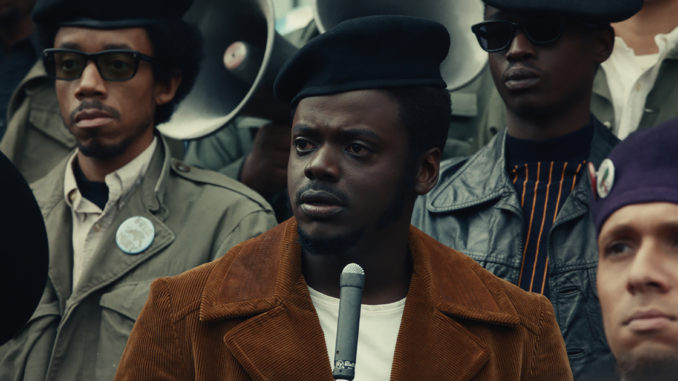
Up-and-coming director Shaka King released “Judas and the Black Messiah” on HBO Max Feb. 12 to critical and popular acclaim. The film could not have been released at a more important time, when the struggles and tribulations of influential activists like Fred Hampton, the “Black Messiah” himself, are as relevant today as they were in the late 1960s.
During Black History Month, we consider those men and women who gave their energy and often their lives for an equality that has yet to be attained. King’s “Judas and the Black Messiah” exists in homage to Hampton — the struggles he faced day to day and the betrayals he bore from within and without.
The narrative follows Bill O’Neal, a young Black man who hustles cars but, in one particularly daring instance, is caught red-handed sporting a phony badge. Arrested for impersonating a police officer, O’Neal is brought before FBI agent Roy Mitchell, who, in place of prison time, makes a counteroffer — infiltrate the revolutionary Black Panther Party and report on the actions of Party Chairman Fred Hampton, all at the behest of Director J. Edgar Hoover. O’Neal complies, choosing cooperation over almost seven years in a cell.
O’Neal then meets Hampton, a charismatic revolutionary with a penchant for public speaking and dreams of a socialist society where men and women of all colors are treated equally. The film largely follows Hampton through O’Neal’s eyes as O’Neal grows closer with the party chairman and his compatriots and more reluctant to collude with the FBI — a conflict appropriately dubbed as a battle for O’Neal’s soul. Also brought to the fore is Hampton’s relationship with Deborah Johnson, a new recruit he quickly falls for. When Johnson becomes pregnant, Hampton must decide how much he’s willing to risk for his dreams. This relationship serves to flesh out Hampton’s character beyond his existence as the face of a revolution.

While the central drama between O’Neal and Hampton works for the most part, there are some problems concerning its pacing. For much of the film’s runtime, O’Neal seems absolutely committed to whichever side he is on in the particular moment. When he’s with Hampton and the other Panthers, he unfailingly echoes their cries for justice. When he’s reporting back to Mitchell and, ultimately, Director Hoover, he surrenders whatever information is requested of him. While it is understood that much of the conflict surrounding O’Neal is internal, a level of explicitness would have been appreciated. It is only in the film’s final third or so that O’Neal shows remorse, making it difficult to sympathize with him as it was so easy to condemn his actions for the majority of the film.
These pacing problems do not carry over to LaKeith Stanfield’s acting, however. Stanfield consistently plays O’Neal as the character’s been written — a sordid double agent who ultimately sympathizes with the cause he was forced to infiltrate and help undermine. When remorse is required of him, Stanfield brings that remorse with tangible force. He provides a performance that gives one pause, inviting them to consider the heft of the situation.
Daniel Kaluuya as Fred Hampton is likewise stellar, embodying the revolutionary’s distinct personality and mannerisms with ease. Hampton’s many speeches throughout the film are made more powerful through Kaluuya’s portrayal of a character who never cracks under the pressure of his influential movement. Witnessing Hampton deliver a speech to his Rainbow Coalition — a multicultural alliance encompassing numerous previously separate organizations — was enthralling and dramatic, especially in a crowd where an individual would just as likely sport a Confederate flag as they would a raised fist.
Finally, Jesse Plemons delivers another strong performance as Roy Mitchell, the almost sympathetic but ultimately complacent FBI agent responsible for overseeing O’Neal’s infiltration of the BPP. He is essentially the embodiment of what Martin Luther King Jr. described in his Letter from Birmingham Jail as the “white moderate,” someone “who is more devoted to ‘order’ than to justice,” whose “[l]ukewarm acceptance is much more bewildering than outright rejection.” In so many of his roles, Plemons brings an aura of awkwardness that elicits an almost overbearing sensation of unease. He manages to be threatening but not provoking, striking this balance by way of a particularly unnerving mildness. That aura is in full swing here.
“Judas and the Black Messiah” is a brutal but important film. King provides an angle of history that so many know little to nothing about. Before watching this film, many could not have told you who Fred Hampton was or what the Rainbow Coalition represented. Before watching this film, many knew nothing of the FBI’s corruption in the late 60s or of Director Hoover’s vendetta against Black revolutionaries. In these ways, King’s film works doubly as a reenactment of a significant movement in American history and as an exposé of the American institution that tried to and effectively succeeded in smothering it. Although there are some problems with the execution of its character-to-character drama, “Judas and the Black Messiah” knows the importance of its message and provides a ruthless portrayal of timelessly relevant events.
